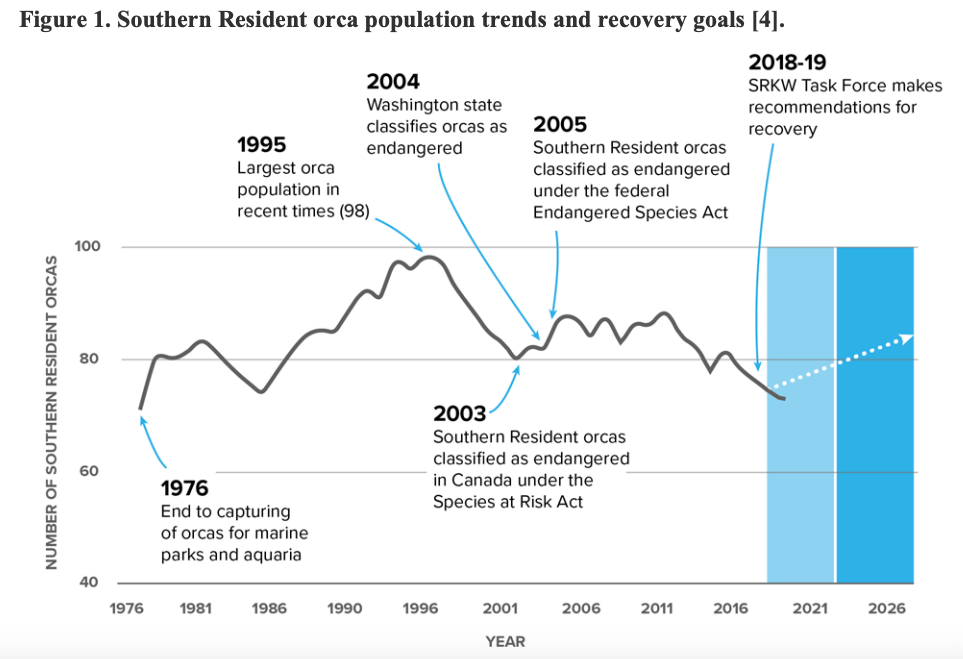— from InvestigateWest.org —

In a move promoted by environmentalists and others as key to staving off the extinction of Puget Sound orcas, but opposed by the building industry, Washington may soon take a first, small step toward requiring that development benefit the environment.
“It sets a standard of leaving [the environment] better than we found it.” ~Rep. Debra Lekanoff
The budget proposed by the House of Representatives calls for planners to begin preparing to replace the state’s requirement that construction cause “no net loss” to habitat with a higher standard backed by environmental advocates — “net ecological gain.” It appears Washington would be the first state in the nation to do so.
The budget put forward by the Senate has no such provisions, though. Legislators in both houses are expected to negotiate an agreed budget in coming days.
The proposed new standard would be something of a sea change for land use in Washington. Builders doing damage to the environment would be required to create or restore more ecological capacity than their construction destroys. The century-plus-long decline in Washington water quality and the diminishing numbers of salmon might begin to be reversed.
“It sets a standard,” said Rep. Debra Lekanoff, the Legislature’s leading advocate for the change, “of leaving [the environment] better than we found it.”
“It’s sort of making current developers pay for the sins of the past. That’s just, quite frankly, unfair.” ~Jan Himebaugh, government affairs director for the Building Industry Association of Washington
Opponents contend the change amounts to government-sponsored theft, in that today’s builders would be paying for degradation — which occurred with the state’s blessing — from which others profited in the past. Local governments, too, are concerned that a shift in policy could prove expensive if they ultimately have to compensate landowners for the additional work.
Requiring additional environmental work would also slow homebuilding in the state while raising construction costs, said Jan Himebaugh, government affairs director for the Building Industry Association of Washington (BIAW). Washington’s housing inventory has not grown as fast as the state’s population, she said, driving housing prices to unaffordable levels in much of the state.
“It will slow that permitting process even more … and those costs that are already out of control will skyrocket,” said Himebaugh, whose organization represents homebuilders in Olympia. “That’s not good for housing, and that’s not good for the people of Washington who need homes.”
Over the past decade, “net gain” requirements have emerged as a priority for environmental advocates. The United Kingdom has in recent years moved toward enforcing the standard, as had several federal agencies in the United States. President Trump reversed course in 2017, issuing an executive order that rescinded an Obama-era directive that federal agencies seek to achieve a net ecological benefit when permitting development.
The proposed more stringent standard for Washington law was among the recommendations from the Southern Resident Orca Task Force, a collection of state and tribal leaders, bureaucrats and activists called together following successive deaths of the orca that frequent Puget Sound seasonally. The killer whale population has continued to decline in the two years since the task force was convened; six of the resident whales, which now number 72, have died since 2018.

Credit: Southern Resident Orca Task Force
In the two years since the Southern Resident Orca Task Force was convened, the number of orcas has continued to decline. Six of the resident whales, which now number 72, have died since 2018.
READ FULL ARTICLE: https://www.invw.org/2020/03/04/with-orcas-in-jeopardy-olympia-considers-making-new-development-pay-for-past-sins/
**If you are reading theOrcasonian for free, thank your fellow islanders. If you would like to support theOrcasonian CLICK HERE to set your modestly-priced, voluntary subscription. Otherwise, no worries; we’re happy to share with you.**








